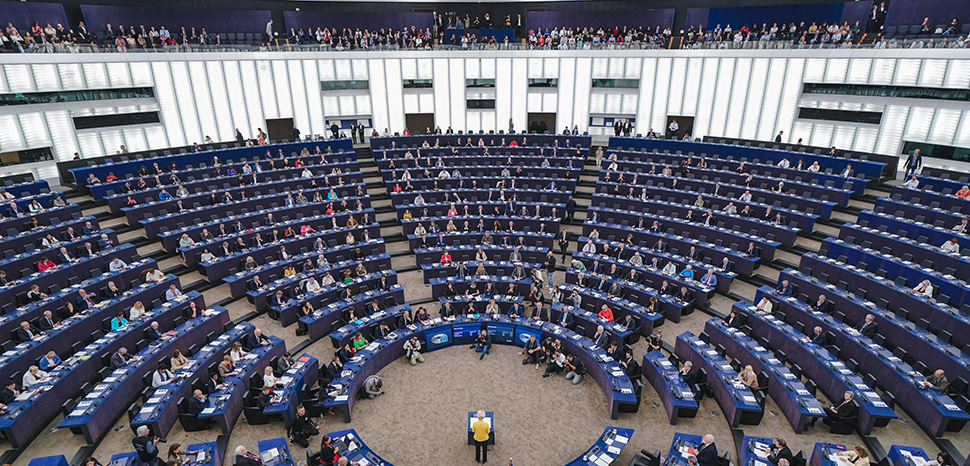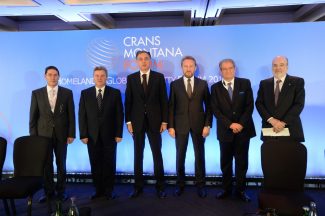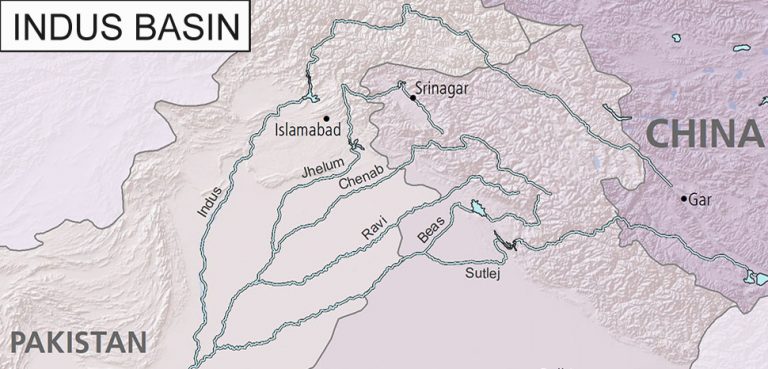The upcoming year will bring shifts in political arenas and changes in national and EU-level politics. In 2024, there is expected to be a new composition of the European Parliament; a significant change among the existing EU Commissioners; the possibility of a new Commission President; and undoubtedly a new President of the European Council.
This political transition will inevitably bring a shift in policies. Whether or not the Commission President remains unchanged, the introduction of a new policy priorities from the European Council and the European Parliament, alongside with new Commissioners, will result in a changed agenda. Foreign factors such as the war in Ukraine, Israel-Gaza conflict, green transition, and economic challenges – especially those concerning the EU budget – will loom large.
Since 2020, the EU has borrowed about €807 billion. Extending foreign policy and influence actions, such as providing aid, helping conflict zones (Ukraine) and southern European states to manage migration, is expected to require an additional €70 billion in 2024. The EU deficit rules were suspended during Covid pandemic, which allowed Member States to take whatever they needed to support their economies. In this, the leading borrowers are Italy and Spain. However, we can expect old deficit rules to come back into force in 2024. This will likely have an impact on proposals, with highly indebted countries possibly getting more time to get their affairs in order. It will certainly create tensions between the Member States over who will bear the costs. EU Finance Ministers and leaders are set to make their final decisions on the matter starting next week.
An Agenda for the Incoming EU leadership
The incoming leadership is expected to devote most of its time to the following issues:
- Energy and climate policy
- Geopolitics – China, US, Ukraine, Russia, Africa
- EU enlargement (Western Balkans). We can see positive developments with Albania and N. Macedonia; however, less so with Belgrade-Pristina, especially if President Vučić remains in power, in which case we can expect requests for more special treatment from Brussels in return for their continued EU accession commitments, while Bosnia & Herzegovina still needs to make an effort on internal issues and Republika Srpska.
- EU competitiveness. Industry, infrastructure, regulations, workforce skills, investments, technology, trade, innovations, economy – here we can expect the EU Parliamentarian groups to apply pressure on the new Commission. For example, Mario Draghi in his report in spring 2024 will present new policy ideas and advice.
- Security strategy, defence, cybersecurity (Cyber Resilience Act), data protection, telecommunications
- Capital markets, health, economic security
- Tax regulations, workers’ rights and income
- Multilateral trade disputes settlement within WTO
- Artificial intelligence regulations
- Borrowing and fiscal framework. Member States with deficit levels surpassing 3% of their GDP would need to implement a multiyear spending plan lasting 4-7 years, aiming to gradually accommodate their expenditures without delaying economic growth. The fundamental agreement in this proposal entails the Commission to provide member states with increased fiscal flexibility to bolster investments; however, this assistance comes with the condition of accepting enhanced monitoring of their spending.
European Commission
European Commission President Ursula von der Leyen is confident of reappointment, yet alterations in national governments since 2019 will influence the composition of the College of Commissioners and the policy agenda. EPP, to which she belongs, in the next term will find itself historically weakened within the European Council. Nevertheless, von der Leyen continues to be the easiest option for EU heads of state and governments. In the event that she is not selected, the competition becomes extensively open.
If Ursula von der Leyen is elected as the EPP’s Spitzenkandidat and is, in any case, the Council’s preferred choice, both sides can claim victory without compromising their ideological values. On the other hand, if she is not selected, and another candidate emerges as the winning Spitzenkandidat, there is no indication that the European Parliament has the determination and unity among group leaders to risk a crisis and push their candidate through. This was not the case in 2019, and in 2014, when Jean-Claude Juncker had the advantage of being largely tolerable to most of the European Council.
Previously the Council explicitly articulated a strong predisposition for a President possessing significant ministerial experience, a quality potentially missing in European Parliament EPP Spitzenkandidat such as Roberta Metsola or Manfred Weber. However, any European Parliament group securing the majority of seats will carry some moral weight in asserting the Commission presidency for a candidate from their group.
Given the current polling data and institutional standings, it looks favourable for Ursula von der Leyen’s prospects for securing a second term.
Ursula von der Leyen is currently in a strong position to secure her reappointment as the Commission President, but she still faces some challenges. Although she currently has support from German Chancellor Scholz, who prefers her over a Green candidate, maintaining this support may prove more challenging if she is not selected as the Spitzenkandidat. While her candidacy seems likely, it is not guaranteed, given her poor relationship with Manfred Weber, the EPP’s Secretary-General and group leader in the Parliament. Weber has previously advocated for alternative Spitzenkandidat, such as the current European Parliament President Roberta Metsola. Additionally, some EPP members are dissatisfied with von der Leyen’s program, seeing it as leaning too far to the left, especially regarding the green transition.
Von der Leyen will also need the support of President Macron, and this backing is not assured, potentially influencing her responsiveness to French perspectives in the coming year. However, the existence of a realistic alternative candidate more favorable to France is unclear. As long as von der Leyen secures the EPP’s Spitzenkandidat status and the EPP achieves a plurality in the European elections, her reappointment appears likely. Failure to meet either or both of these conditions could pose challenges to her continuation in office.
In case von der Leyen is not proposed as the candidate for the next Commission President, the former Italian Prime Minister and leader of the ECB Mario Draghi could gather support in bid for the top EU position. The majority of Member States do not have a supportive opinion of a French candidate, for example Commissioner Thierry Breton and his aspiration for candidacy. Other candidates might be former Finnish PM Alexander Stubb, IMF Managing Director Kristalina Georgieva, Stéphane Séjourné the present leader of Renew Europe and a close associate of French President Macron, former Irish PM Michael Martin and former Luxembourg PM and present Deputy PM & Foreign Minister Xavier Bettel. These candidates also qualify for the President of the European Council position as Charles Michel cannot be reappointed for another term.
European Council
The crucial institution in shaping the agenda for the upcoming political cycle is the European Council. This body is responsible for selecting the next President of the Commission and other key positions, with the elected Commissioners significantly influencing the agenda. Additionally, policy negotiations and “political trades” are integral to the appointment process of the Commission President and Commissioners. While the European Parliament exercises considerable influence and challenges the role of the Council, its impact is felt within an agenda that has already been shaped by the Council.
In 2024, the European Council is anticipated to exhibit greater fragmentation compared to 2019. None of the major five EU member states will be governed by the EPP. The heads of state and government are expected to be dispersed across various affiliations, including the EPP, the more conservative ECR, the centrist Renew, the center-left S&D, and notably, Hungary’s unaligned nationalist leader Viktor Orban.

Potential political changes in the European Council comparing 2019 and 2024. Chart is created according to public and non-public accessible information by Leo von Breithen Thurn. December 2023. ©
European Parliament
Predictions see the European Parliament moving toward the right following 2024 elections, but this shift may not necessarily lead to a steady majority. According to current polls, parties aligned with the center-right EPP are likely to maintain their current position, with likely some smaller member states offsetting possible losses elsewhere compared to the 2019 European Parliament election. Parties situated further to the right are anticipated to gain traction in several EU countries, including Italy, despite a less favorable performance by the hard right in Spain’s July election—an outcome attributed to national factors rather than those indicating a pan-European trend. The centrist Renew group is expected to lose ground in its largest national delegation France, particularly Macron’s Renaissance, and the Greens face a similar situation in Germany. Additionally, 2024 appears challenging for the center-left, facing electoral struggles in Germany and France. However, while this rightward shift is evident, it may not translate into a governing majority solely from the center-right to right. The Renew group is strongly opposed to forming a coalition with the center-right and far-right, expressing a preference for the current coalition that spans the center-left and center-right to persist. On the other hand, even with a coalition bridging the center-right and center-left, the rightward shift is likely to have an impact.
Thus, we can predict four potential ideological compositions of the upcoming European political term starting in mid-2024:
- Right Wing Europe – a right-wing only majority coalition excluding Socialists but including Liberals, in this case EPP, ECR, Ultra-Right and Liberals. This coalition is unlikely, especially because of difficulties and differences on positions ranging from European integration (EU expansion), immigration, respect of the rule of law, to the war in Ukraine.
- Conservative Europe – a center-right coalition of EPP, Socialists (S&D) and Liberals. This coalition might also include other conservative and right political groups in the European Parliament, such as ECR, which could result in considering another more conservative candidate for the Commission President. Under such a scenario, Ursula von der Leyen’s chances of reappointment would be less certain.
- Green & Centre-Right Europe – in addition to the EPP, Socialists, and Liberals, this coalition is set to incorporate the Greens, solidifying its position as the largest voting majority in the European Parliament. This arrangement could significantly benefit Ursula von der Leyen in her bid for re-election. The formation of such a coalition is not highly anticipated and would be inherently delicate. Potential hindrances to establishing it could arise from center-right parties, particularly those criticizing the ‘Green Deal’ during election campaigns.
- New Old Europe – the existing coalition of EPP, Socialists and Liberals is very likely and will support Ursula von der Leyen’s re-election as Commission President. This implies that the Commission’s agenda will continue as before, incorporating a few new plans and fresh Commissioners. However, from mid-2024 their majority in the European Parliament will be less strong, requiring them to actively seek support from other parties for votes.
In conclusion, it is anticipated that the center-right EPP and center-left S&D will maintain their front-runner positions, with EPP securing between 160-170 and S&D between 135-145 seats in the European Parliament. EPP and the S&D groups usually support the European Commission, as they are both moderate and pro-European. Therefore, the positioning and role of the EPP will be significant. The effective majority, when combined with Renew Europe, is projected to decrease, providing ECR with greater influence in decision-making as a new essential political player in Europe.




